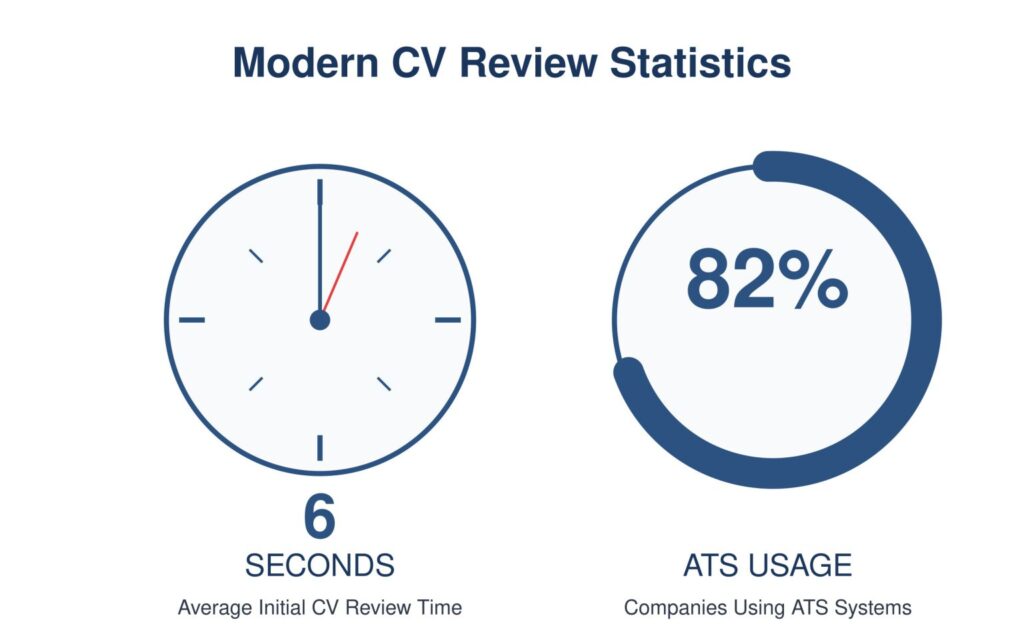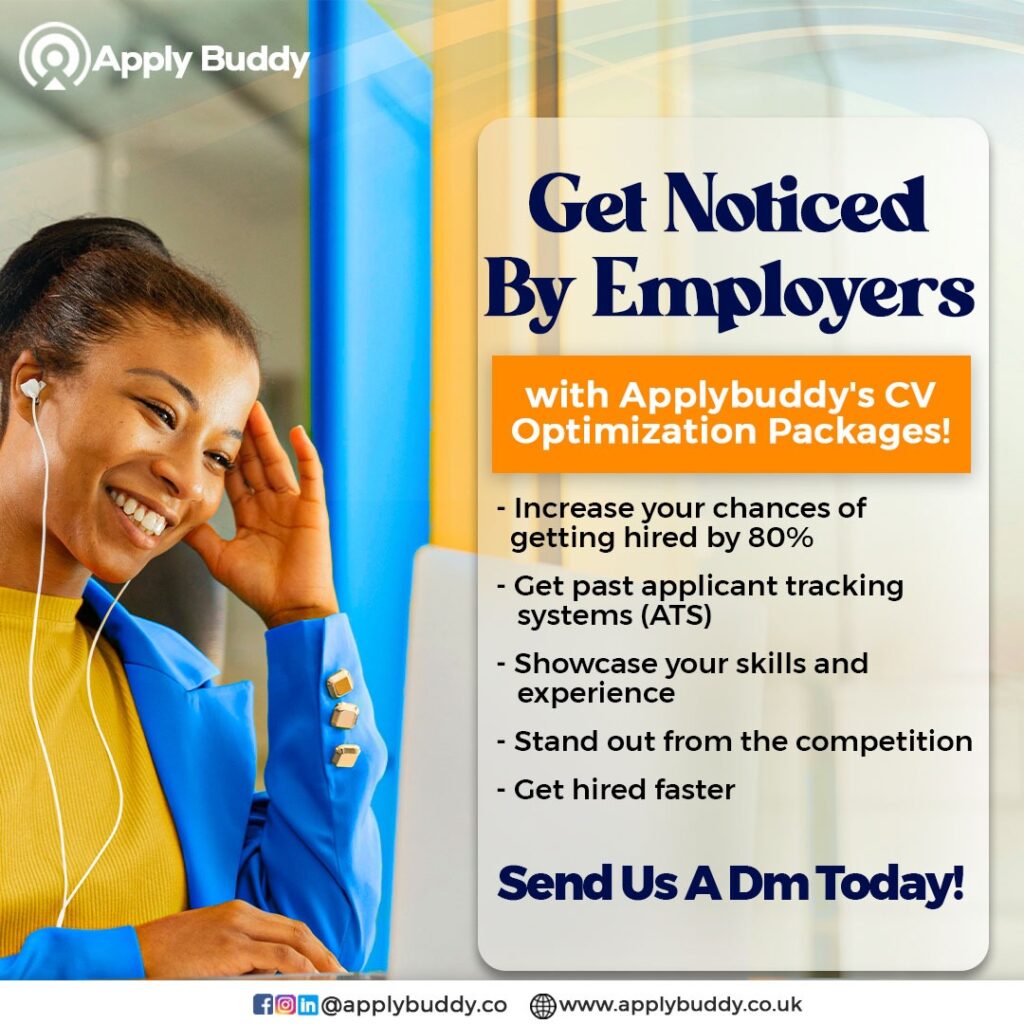Knowing how to write a CV that gets noticed by recruiters is a critical skill for job seekers aiming to secure interviews and achieve career success. The realities of today’s job market make crafting a standout CV essential. A well-prepared CV serves as the first impression, showcasing skills, experiences, and qualifications in a way that resonates with recruiters.
By effectively highlighting relevant strengths and tailoring your CV to the specific role, it’s possible to influence a recruiter’s decision-making process significantly. This comprehensive guide will provide the insights needed to create an impactful CV, covering everything from understanding what recruiters are looking for to selecting the optimal CV format.
Also, avoiding common mistakes that can cost valuable opportunities and optimising CVs for applicant tracking systems (ATS) will enable a candidate to capture a recruiter’s attention and stand out in a crowded job market.

Understanding What Recruiters Look For
To write an outstanding CV, it is essential to understand what recruiters are looking for when they review applications. Recruiters typically look for CVs that demonstrate a candidate’s qualifications, skills, and experiences relevant to the position they are hiring for. They focus on clarity, relevance, and professionalism.
Only 25% of resumes make it past the ATS and in front of a human recruiter! This means that 75% of resumes don’t qualify because of formatting, content, or lack of keywords.
Recruiters often have to sift through many CVs, which makes it crucial for yours to catch their attention quickly. The CV should be well-organised and easy to read, with clear headings and a logical flow. Recruiters appreciate a concise yet comprehensive overview of the candidate’s skills and experience. Using industry-specific terminology and showcasing achievements can make a significant impact.
Top CV Keywords and Phrases That Recruiters Search For
Recruiters and hiring managers often use keywords to filter and prioritise CVs. Incorporating the right keywords is crucial in learning how to write a CV that gets noticed by recruiters. These keywords often align with the skills and qualifications required for the position. Using relevant keywords throughout a CV increases the chances of the application being shortlisted.
For example, when applying for a marketing role, include keywords such as “digital marketing,” “SEO,” “content strategy,” and “campaign management.” When targeting a project management position, keywords like “project planning,” “team leadership,” and “budget management” could be relevant. Tailoring the CV to each job application using keywords from the job description is essential.
Read also:
The Ideal CV Format: Chronological, Functional, or Combination?
There are three main types of CV formats: chronological, functional, and combination. Each format has advantages; the choice depends on the candidate’s background and the job they are applying for.
- Chronological CV: This format lists work experience in reverse chronological order, starting with the most recent position. It’s ideal for those with a solid work history and evident career progression.
- Functional CV: This format focuses on skills and achievements rather than a timeline of job roles. It’s useful for those with gaps in employment or who are changing careers.
- Combination CV: This format merges the chronological and functional formats, highlighting skills and providing a timeline of job roles. It is ideal for most job seekers as it offers the best of both worlds.
The Importance of a Clean, Professional Layout
The layout and design of the CV play a crucial role in making a positive impression on recruiters. A clean, professional layout ensures the CV is easy to read and navigate. A simple font like Calibri, Arial or Times New Roman in sizes 10-12 is recommended. Using headings and subheadings helps organise the content and makes it easy for recruiters to find the information they seek.
Consistency in formatting is essential to create a polished and professional look. This includes using the same font style and size throughout the CV and ensuring that bullet points, spacing, and margins are uniform. Avoid using excessive colours, graphics, or images, as these can distract from the content and make the CV challenging to read.
How to Craft a Powerful Personal Statement for Your CV
The personal statement, or a professional summary, is a brief introduction at the top of the CV. It is a snapshot of the candidate’s qualifications, skills, and career goals. A powerful personal statement can grab a recruiter’s attention and encourage them to read more.
When crafting a personal statement, it is essential to keep it concise, ideally between 50-150 words. The statement should highlight the candidate’s most relevant skills, experiences, and career aspirations. Using confident, positive language and avoiding clichés or generic phrases is essential.
Read also:
How to Balance Hard and Soft Skills in Your CV
Hard skills are concrete, measurable abilities acquired through education, training, or hands-on experience, such as proficiency in software programs, language fluency, or specific certifications. These skills are essential for performing job-specific tasks and can be easily demonstrated and verified. In contrast, soft skills are intangible personal attributes like communication, teamwork, and problem-solving that influence how effectively you interact with others and adapt to different situations.
To create a well-rounded CV, balancing hard and soft skills is important. Highlight hard skills in a dedicated section, ensuring they align with the job requirements. Additionally, provide context within your work experience by showcasing how these hard skills have been applied in real-world scenarios, alongside examples of soft skills in action. This approach helps recruiters understand your technical proficiency and ability to thrive in collaborative environments.
Tips on Quantifying Achievements and Experience
Quantifying achievements and experience can significantly enhance the impact of a CV. Rather than simply listing job duties, you should provide measurable outcomes to demonstrate your contributions and achievements. For example, instead of stating “managed a team,” you could say “managed a team of 10 employees, leading to a 20% increase in productivity.”
Providing specific examples and quantifiable data on your CV helps recruiters see the scope of responsibilities and the tangible results achieved. Quantifying accomplishments—such as increasing sales by 20% or managing a team of 10—adds credibility, allowing recruiters to assess your potential impact on their organisation. This concrete evidence makes your CV more compelling.

Steps for Customizing Your CV for Different Job Applications
Customising a CV for different job applications is crucial in learning how to write a CV that gets noticed by recruiters. Each job application is unique, and tailoring the CV to match the specific requirements and preferences of the employer can make a significant difference. 63% of recruiters say that job seekers’ biggest mistake on their resumes is not tailoring their resume to the specific job they are applying for.
- Read the job description: Understand the requirements and responsibilities of the role.
- Highlight relevant experience: Adjust the content of your CV to emphasise the experience and skills most relevant to the job.
- Use the right keywords: Incorporate keywords from the job description into the CV, including core skills and job description sections.
- Tailor the professional summary: Customise the professional summary to align with the job and company.
- Update the skills and achievements: Ensure the most recent and relevant skills and achievements are highlighted.
Common CV Mistakes to Avoid That Can Cost You the Job
Common CV mistakes, such as typos, grammatical errors, and using an unprofessional email address, can significantly harm the chances of securing a job. These errors suggest a lack of attention to detail and professionalism, critical qualities in most roles. Including irrelevant or outdated information can also detract from the CV’s impact, making it harder for recruiters to see true strengths and qualifications. This can lead to confusion and diminish the chances of standing out.
Equally detrimental is the failure to tailor each CV to each job application. A generic CV may signal a lack of genuine interest or effort, reducing overall appeal to recruiters. A well-crafted CV should be concise, polished, and customised to highlight the specific skills and experiences that match the job’s requirements. Tailoring each CV demonstrates enthusiasm for the position and a commitment to aligning qualifications with the employer’s needs.
Read also:
Tips on how to avoid these mistakes
A comprehensive checklist is provided below to avoid common CV mistakes at various levels. If left unchecked, these mistakes can severely affect the applicant’s chances of getting an interview.
- Typos and grammatical errors: Always proofread your CV for typos or grammatical errors. Consider using tools like Grammarly for assistance.
- Lack of focus: A CV that lacks focus can confuse recruiters. Ensure that your CV is targeted towards the job you are applying for.
- Irrelevant information: Avoid including irrelevant information, such as unrelated work experience or personal details.
- Excessive length: Keep your CV concise and to the point. A two-page CV is generally sufficient for most candidates.
- Unprofessional Email Address: Use a professional email address, preferably with your name.
Optimizing Your CV for ATS: Keyword Placement Tips
Many companies use Applicant Tracking Systems (ATS) to filter and prioritise CVs. Optimising a CV for ATS involves using the right keywords in the right places. Place keywords from the job advertisement strategically throughout the CV, including in the professional summary, skills section, and work experience section.
Using standard headings, such as “Work Experience,” “Education,” and “Skills,” can help ensure that ATS easily reads the CV. Avoiding images and graphics is also important, as ATS may not recognise these elements. Check the formatting of your CV to ensure that it is in a format that ATS can easily read, such as .docx or .pdf.

Simplify your job search with ApplyBuddy!
Our platform streamlines the application process, helping you find and apply for jobs faster.
Get personalised job recommendations, track applications, and increase your chances of success.
Start your career journey with ApplyBuddy today!
Pro Tips to Make Your CV Shine Among the Rest
Start by crafting a unique selling proposition (USP) to make a CV stand out. This means identifying and emphasising the unique skills and achievements that set you apart from other candidates. Regularly updating a CV with new skills, experiences, and qualifications keeps it relevant and ensures it accurately reflects current capabilities.
A professional design is also crucial for an outstanding CV; a clean, organised layout with clear headings and consistent formatting enhances readability and demonstrates attention to detail. Additionally, seeking feedback from mentors or industry professionals can provide valuable insights to refine your CV, ensuring it effectively communicates your strengths and potential contributions to a prospective employer.
Conclusion: How to Write a CV That Gets Noticed by Recruiters
Learning how to write a CV that gets noticed by recruiters involves understanding what they are looking for, choosing the correct format, and customising each CV for each job application. By avoiding common mistakes and optimising your CV for ATS, you can increase your chances of getting noticed by recruiters and landing your dream job.
Remember, a well-crafted CV is your ticket to getting a foot in the door.
FAQs: How to Write a CV That Gets Noticed by Recruiters
What should I include in my CV if I have no work experience?
If you have no work experience, include relevant education, skills, and achievements in your CV. Highlight coursework, projects, or certifications related to the job. Add volunteer work or internships to demonstrate commitment and practical skills. Emphasise soft skills like communication and teamwork, and tailor your CV to the specific job requirements.
How long should my CV be for a job application?
A CV should ideally be one to two pages long for most job applications. This length is sufficient to showcase your relevant skills, experiences, and accomplishments without overwhelming the reader. One page is often enough for entry-level candidates, while experienced professionals can extend it to two pages if necessary.
Should I include a cover letter with my CV?
Yes, you should include a cover letter with your CV. A cover letter allows you to introduce yourself, explain your interest in the position, and highlight specific skills or experiences that make you a strong candidate. It complements your CV and can make your application stand out.
How often should I update my CV?
Update your CV every six months or after completing a significant project or course or gaining new skills. This ensures that your CV remains current, accurately reflects your qualifications, and is ready for new opportunities, making it easier to tailor for specific job applications.
